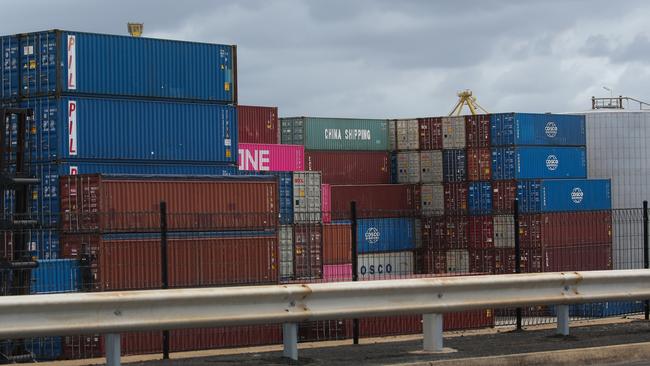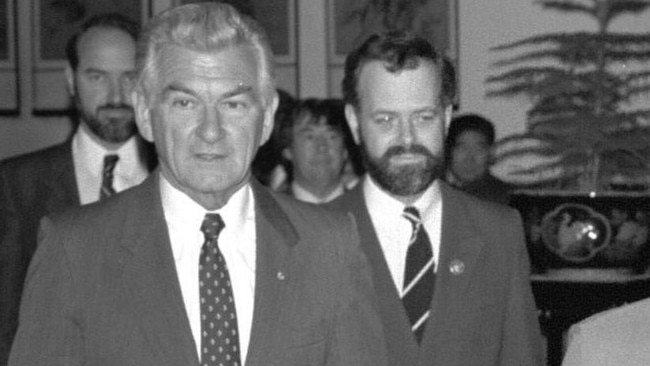If the wrong work practice decisions are made in coming days, stevedoring costs will explode and send our cost of living further skywards.
Solving the problem requires the 2024 Prime Minister of Australia Anthony Albanese to embrace the techniques one of our best peacetime Prime Ministers, the late Bob Hawke.
The Royal Family in Dubai, who own the DP World operation, have probably never heard of Bob Hawke but should be aware if his techniques are not embraced their fate will replicate that of Ford and General Motors in Australia who were forced to retrench their entire manufacturing workforces (Ford kept research).
In The Weekend Australian I set out the base problem facing DP World and its workers. DP World is paying its workers substantially below its rival Patrick.

The union says the difference is 17 per cent. The exact difference might be debated but it is substantial and is well over 10 per cent. It’s not sustainable.
DP World has not automated its operations and clauses in current enterprise agreements mean its workforce is not productive, so if the situation continues and wages are lifted to anywhere near the Patrick level it will incur deep losses unless stevedoring charges rise substantially.
Of course, higher charges to help DP would deliver the efficient Patrick’s operation a huge profit while saddling Australia’s cost of living with much larger import costs.
Subsequent to my weekend commentary, I learned DP World’s current enterprise agreement — plus clauses being proposed by the unions — means DP world will operate under rules similar to the old motor industry, where unions effectively co-managed the operations.
And in DP World’s Australian operation they must even consult with the unions on important capital expenditure and go to an independent arbitrator if agreement can’t be reached. There is no way the Dubai royal family can justify investing $1 billion to automate with this sort of constraint in its enterprise agreement.
In the motor industry the large costs of similar “agreements from hell” were covered by a government subsidy, which when removed Ford and GM had no choice but to retrench every single worker and manager and shut down.
With wages well below its rival, DP is profitable, but once it matches its rival, its business is worthless because of the productivity constraints in its enterprise agreement.
It needs a subsidy via higher charges to customers. Without a subsidy the DP enterprise agreement means the DP World Australian operation has no value.
Albanese’s industrial relations minister Tony Bourke last week talked to the parties but thought simply lifting DP World wages to match Patrick would solve the issue, but of course pass the problem on to ordinary Australians.
But, Burke may have a follow up plan. If he can get his industrial relations legislation through the Senate, key powers of ACCC chief Gina Cass-Gottlieb will be machine gunned to enable a cartel between unions and road transport companies to lift prices (and our cost of living).
It’s possible, with the ACCC crippled, another union-corporate cartel might be imposed on the waterfront because, under the union plan, in two years all enterprise agreements mature at the same time and they might be able to cripple Patrick with a DP World-style agreement.
With respect to the great man, this is how I think Bob Hawke would approach the problem. Patrick has an operating enterprise agreement which enables its automated plants in Sydney and Brisbane to work efficiently.

In Melbourne the agreement enables a non-automated plant to operate in a way which makes it uneconomic for Patrick to invest heavily to automate and the company would have to retrench many managers and workers.
Patrick’s Melbourne workforce know if they play silly games like those authorised in the DP World agreement then Patrick would immediately follow Sydney and Brisbane in automation and large retrenchments.
The workers and the managers know they would lose high paid jobs which are high paid because Patrick has the capital and is not bluffing.
A Hawke-style solution might first put the issue of DP wages to one side, then have a classic situation where the same union has agreed to work efficiently in one enterprise but not at its rival.
This simply puts the rival out of business unless there are much higher prices. The obvious solution is for the base Patrick agreement to be forced on DP World, its unions and managers. My guess is while many of the DP World managers may have the skills required to try and manage unions, very different skills are required to properly manage an operation.
The company might have to entice top operational executives from Patrick to duplicate the Patrick Melbourne situation where the workforce, including managers, know unless they work properly the plant will be automated and their high paid jobs lost.
At General Motors the managers suddenly woke up to the fact they were in the same boat as the workers and after months of desperate negotiations actually reached an agreement to make the plants efficient, but it was too late and all lost their jobs.
Once DP World has a Patrick-style enterprise agreement with top executives able to manage it and an ownership which can automate if required, then there’s no reason why DP World can’t pay the same wages as Patrick.
In the process Australian companies and workers might learn much higher rewards come when the productivity is increased.






Prime Minister Anthony Albanese is this week calling his ministers together to discuss the cost of living. What they are unlikely to recognise is one of our biggest cost of living threats arises from what is happening on the waterfront.